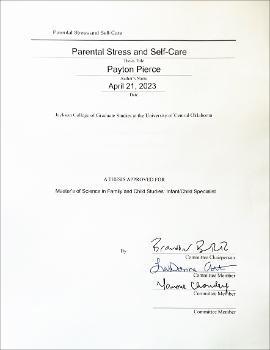| dc.contributor.advisor | Burr, Brandon | |
| dc.contributor.author | Pierce, Payton | |
| dc.date.accessioned | 2023-06-26T16:54:49Z | |
| dc.date.available | 2023-06-26T16:54:49Z | |
| dc.date.issued | 2023 | |
| dc.identifier.other | (AlmaMMSId)9982957507602196 | |
| dc.identifier.uri | https://hdl.handle.net/11244/337835 | |
| dc.description.abstract | Stress is a concerning contributor to non-optimal parenting practices. Why is educating parents on self-care not an evidence-based practice? Research indicates stress impacts parenting in negative ways. More specifically, stress has been linked to the use of more harsh parenting practices (Chung et al., 2020). These changes in parenting behaviors have the potential to effect children's development. Children may have an increased chance of long-term illnesses (Center for Disease Control and Prevention, 2019), hindered development of higher cognitive processes (Harvard Health, 2020), and behavioral problems (Neece et al., 2016). There is little known about the effects of self-care on parental stress. Literature on self-care suggests it is beneficial in preventing burnout in mental health providers (La Mott & Martin, 2016) and coping with mental illnesses such as schizophrenia (Martyn, 2003) and depression (Khan et al., 2007). Related to parent education, the Triple-P Positive Parenting Program mentions self-care briefly suggesting that being a parent is personal self-care (Sanders, 1999). However, the current study aims to explore self-care as activities parents do to alleviate general stress. The purpose of this study was to determine if there is a correlational relationship between parental stress and self-care practices. It was hypothesized that parents reporting higher levels of stress would have lower self-care scores. A correlational study design was most appropriate for this research because it allows for several variables to be measured. Two measurement tools, Perceived Stress Scale (Cohen et al., 1983) and Mindful Self-Care Scale (Cook-Cottone & Guyker, 2017), were administered to participants utilizing the Qualtrics software. The findings of this study found a significant negative correlational relationship between parental stress and self-care, confirming the hypothesis. Future research can expand upon this in investigating whether educating parents on self-care lowers their reported stress scores. | |
| dc.rights | All rights reserved by the author, who has granted UCO Chambers Library the non-exclusive right to share this material in its online repositories. Contact UCO Chambers Library's Digital Initiatives Working Group at diwg@uco.edu for the permission policy on the use, reproduction or distribution of this material. | |
| dc.subject.lcsh | Parents--Mental health | |
| dc.subject.lcsh | Self-care, Health--Psychological aspects | |
| dc.subject.lcsh | Stress (Psychology) | |
| dc.title | Parental stress and self-care | en_US |
| dc.type | Academic theses | |
| dc.contributor.committeeMember | Atkins, LaDonna | |
| dc.contributor.committeeMember | Choudry, Mansur | |
| dc.thesis.degree | M.S., Family and Child Studies-Infant/Child Specialist | |
| dc.subject.keywords | Child development | |
| dc.subject.keywords | Parenting | |
| dc.subject.keywords | Self-care | |
| dc.subject.keywords | Stress | |
| dc.subject.keywords | Individual & family studies | |
| dc.subject.keywords | Behavioral psychology | |
| dc.identifier.oclc | (OCoLC)1386274597 | |
| thesis.degree.grantor | Jackson College of Graduate Studies | |
